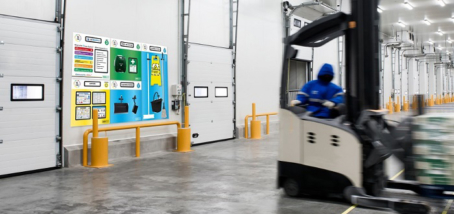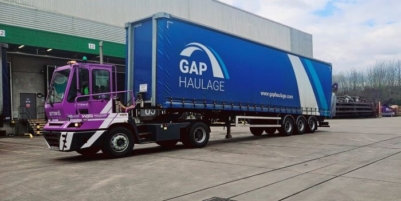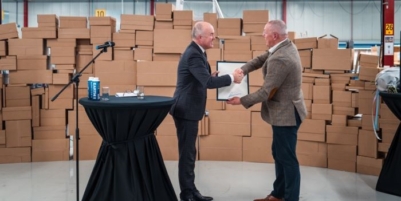-
Nutrivend selects Forterro’s Orderwise to support online expansion and streamline operations - April 11, 2025
-
ARROWXL LAUNCHES AMBITIOUS ZERO WASTE ROADMAP - April 8, 2025
-
THE BCMPA’S NEW CAMPAIGN DRIVES OUTSOURCING SUCCESS IN Q1 - April 7, 2025
-
BLACKOUT TECHNOLOGIES TARGETS TELEMATICS-INTEGRATED MOBILE DEVICE BLOCKING TO COMBAT SMARTPHONE DISTRACTION - April 1, 2025
-
Sparck Technologies awarded Royal designation - March 27, 2025
-
OpenADR Alliance announces first OpenADR 3.0 certified products with EVoke Systems, E.ON Energy and Universal Devices - March 25, 2025
-
Growing fulfilment and contract packer appoints new Managing Director - March 25, 2025
-
When is it time to invest in a WMS? Understanding the key trigger points - March 25, 2025
-
eCapital helps Vantage Recruitment on its journey to financial success - March 24, 2025
-
Hugo Beck Celebrates 70 Years of Packaging Innovation with Open House Events - March 20, 2025
Re-organisation will be a priority for many warehouse and distribution centre operators ramping up to meet higher volumes and demand in the face of Covid 19 and pre-Christmas push, says Jim Roberts, product manager at Beaverswood.
Effective warehouse and logistics centre design encompasses layout and the optimisation of space. It also includes labelling and racking systems, management technologies and designated picking and receiving areas. Industrial workplaces that are clean and well organised will be ready to receive merchandise, prepare orders, load and ship containers, keeping both employees and customers happier in the process.
However, re-organising efficiently can sometimes be easier said than done. Each decision should support a number of goals while supporting increased productivity, optimised space, cost cutting, and improvements in customer service – perhaps, even more so in these pandemic days, which has driven unprecedented surges in online sales and seen sector operators never busier.
Practical steps
Practical, sensible advice to improve warehouse operations can start by investing in new signage. After all, good signage must be considered an effective step on the path to improved levels of performance, operational efficiency and safety in the warehouse environment.
It is a legal requirement to display certain signs in prominent spots around your warehouse. You must also remember that if an incident occurs it could be you that is held accountable if the legislation has not been followed correctly. Guidance on regulations relating to safety signs and signals is covered in the Health and Safety (Safety Signs and Signals) Regulations 1996, which provide information for employers and duty holders, and others who have responsibility for the control of work sites and premises, or operating equipment requiring verbal and/or non-verbal communications.
Featuring a few choice words or simple eye-catching images, a sign in the right location at the right time, can swiftly and effectively communicate an order, direction, or elicit a desired action. It can intuitively educate the uninformed. It can quickly convey a complicated message in a simple way. For example, floor signals and tapes can be laid down to instruct people in the industrial workspace to do a specific task, signalling an appropriate action of safety requirement. These can be reinforced with floor ID frames to mark out important areas for people to strengthen health and safety instructions and bolster your communications.
Important health and safety messages should also be made to stand out. This can be achieved in an industrial environment where not everyone has email access by framing systems used to highlight important documents and critical must-see information pinned to noticeboards. Rotas and cleaning schedules for service areas, washrooms and toilets can also be organised better when displayed in colour-coordinated frames. Similarly, visitors will benefit from seeing notifications and messages displayed on window frames that can then be easily removed and reused again and again.
Refreshing existing labelling and ID systems could also contribute to streamlining operations and improving productivity. Current systems can be augmented or indeed improved, through the application of simple, cost effective measures, which include new ticket and label holders on shelving and racking to provide instant, high visibility location of stock. The use of colour-coded labels can also play a vital role in helping to locate and access stock quickly and effectively while the introduction of new markers to identify warehouse aisles and bays better will improve both safety and traffic routing.
Productivity boost
The use of visual aid boards such as shadow boards can also be considered as part of plans to reorganise the workplace. Again, investment in these type of systems, which ensure compliance with 5S (Sort; Set in order; Shine; Standardise; and Sustain) lean processes, can boost productivity levels in the workplace, keeping essential tools readily accessible and available for use by the workforce.
Improving warehouse efficiency is as much about common sense and a simple but effective system, as it is about sophisticated picking algorithms. And this includes keeping the place clean and tidy with recycling systems that can help to prevent the unwanted build of up of waste and rubbish in and around shelving, bays and aisles and order picking stations. Here, handily placed, space saving, end-of-racking sack systems, which comply with the Hazardous Waste Regulations 2015, should be used be used for the easy collection and segregation of shop floor waste.
Warehouse and distribution centre operators who follow these cost effective and simple steps will ultimately reap the benefit in terms of greater efficiencies and financial savings. They will also lead to improvements in health and safety in workplaces that require a deal of complex planning and product support. Consider your requirements in terms of quality, reliability and performance, and ask how your supplier can help you to implement smart and effective solutions. More at www.beaverswood.co.uk
































